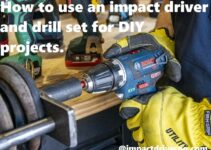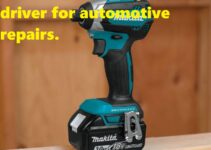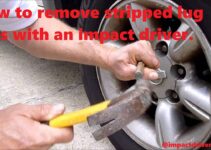Are you looking for the best bit set for your impact driver? Don’t worry, you’ve come to the right place. This guide will help you make an informed decision when selecting a bit set that meets your needs and budget.
We’ll look at the materials, types, and sizes of bits so you can make an educated choice. You’ll be ready to tackle any project quickly and efficiently with the right bit set!
Welcome to a complete guide for choosing an ideal bit set for your impact driver. An impact driver is a tool that can deliver high power output and torque rotation in one unit, which makes it the perfect tool for driving fasteners, nuts and bolts securely and quickly into materials.
This guide will explain what you need to know in order to pick the best bit set for your needs, including the types of bits available and how to determine the correct bit size for your drill. It will also provide tips on buying complete sets as well as selecting individual bits so you can find the most cost-effective solution that meets your needs. With this information in hand, you’ll be able to select the right bit set quickly and confidently, making every project easier and worry-free.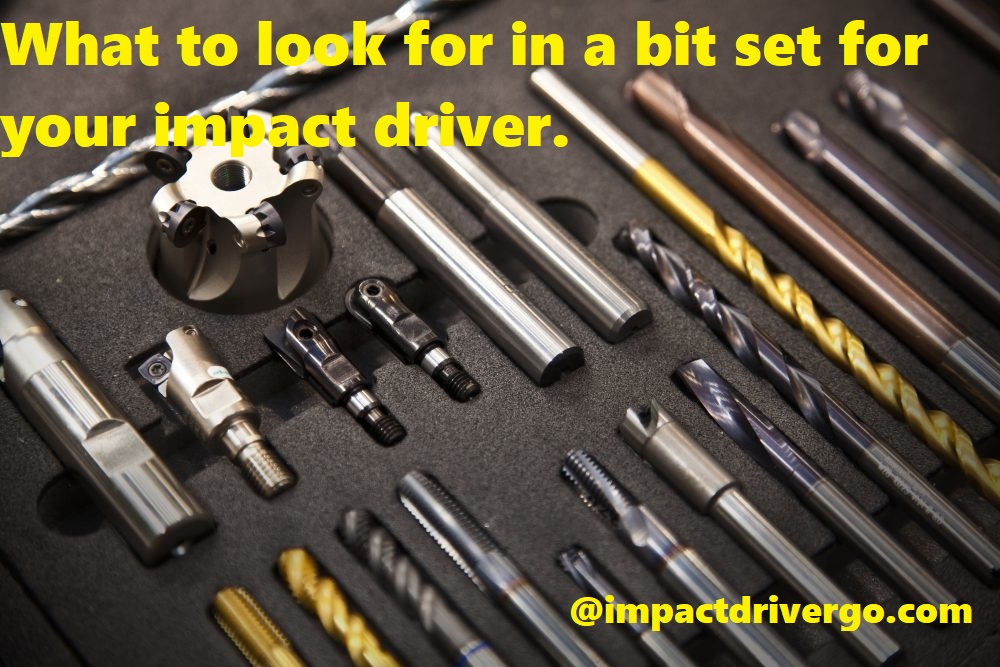
Definition of a bit set for impact driver
A bit set for an impact driver is a collection of bits and accessories used in combination with a high-torque cordless impact driver. Impact drivers use a unique type of torque that allows them to efficiently drive large screws and bolts into harder materials.
The specialized bit set features several attachments, each designed to fit different fasteners and facilitate precision driving. Most sets will include several standard screwdriver bits in various sizes, as well as a variety of specialty bits like nutdrivers, Phillips head bits and spade Bits.
In addition to these common attachments, there can also be more complex devices such as Hex Nut Drivers and specialty socket adapters. These specialized tools help improve the accuracy and speed when driving even the most stubborn screws or bolts into harder materials or tighter turnbuckles.
Importance of choosing the right bit set
When using an impact driver, it’s essential to have the right bit set to ensure that you maximize the efficiency of the tool and minimize potential damage to your work surface. The correct bits for your impact driver will also help minimize wear and tear on both the tool and the bit itself. As a result, selecting the appropriate bit set is one of the most important decisions you can make when it comes to using your impact driver.
Before you buy a bit set for your impact driver, there are several factors that should be taken into consideration. Firstly, make sure that you buy bits that are specifically designed for use with an impact driver as they are built with tougher materials in order to withstand more stress than a conventional screwdriver bit. When purchasing specific bits, it is advisable to look out for ones made from tungsten carbide or high-speed steel as these will often last longer than standard carbon steel options. Additionally, it’s important to choose a bit size that fits both your fastener head and your drill chuck – oversized bits can cause damage by putting unnecessary strain on components such as gears, motors or bearings.
More generally, look for larger bi-metal sets made from hardened high-speed steel combined with bonus features such as extra strength tips or mag-augers which allow small screws to be driven into hard metal surfaces quickly and safely. Finally, some models come with additional components such as magnetic adaptors which are interchangeable between 1/4″ square sockets and 1/4″ hex sockets – this provides extra flexibility when dealing with different screws or fasteners of different types.
Material of the Bits
Whether you’re looking for a basic bit set or something more advanced, it’s important to consider the material of the bits and how they will hold up under heavy use. The most common materials used in bit sets are S2 steel, cobalt M42 alloy, titanium nitride coating and diamond coated.
S2 Steel – This is the most commonly found material used in impact driver bit sets. It is strong and durable and has proven to be very efficient at driving fasteners into hard surfaces like concrete. While it does not provide superior corrosion resistance or any special features for working with harder materials, S2 steel is sufficient for many jobs under normal wear and tear conditions.
Cobalt M42 Alloy – This type of steel has been specifically designed for Bits taking on really tough projects. It contains 8% cobalt that helps to make it one of the strongest tools available for hard applications. Because it is stronger than other metals, Cobalt M42 Alloy also provides superior corrosion resistance and greater heat tolerance so your Bits will last longer even under extreme conditions.
Titanium Nitride Coating – This type of coating adds a layer of protection to your bits set that makes them more resistant to wear and tear while also increasing its lubricity properties so you can drive screws into hard surfaces with ease. The coating also has the added benefit of making your bits look better by providing a distinctive golden color that stands out when compared to other types of Bits sets.
Diamond Coated – If you want to take things up a notch, then Diamond Coated Bits should be your first choice when shopping for an impact driver set as these provide excellent helmet penetration through any material including extra strength HSS metals without having them dulling out quickly over time due its lightweight construction which helps keep the forces on driver from getting too large during even the toughest job applications . Plus because they are already pre-sharpened they don’t require as much effort in getting into tougher materials which leads to longer lasting value over standard grade bits which tend chip away easier over time due their thinner wall build design.
Different materials used in making bits
When choosing a bit set for your impact driver, it is important to consider the variety and quality of the bits available. There are numerous types and materials used to make drill bits, each with its own advantages and disadvantages. Understanding the best uses for each material will help you choose a bit set that meets your needs.
High-Speed Steel (HSS) is one of the most common materials used to make drill bits because of its superior balance between cost efficiency and durability. HSS is ideal for most general applications, producing fast, accurate holes when drilling into wood and ferrous metals like brass or STEEL efficiently.
Cobalt Steel (HSSE7) is designed to stay sharper much longer than regular HSS drills. It can be used for drilling into steel as well as stainless steel without wearing out quickly, resulting in up to 40% faster drilling speeds than HSS in many cases.
Titanium Coated Drill Bits (TiN) are coated with titanium nitride which increases their durability and their resistance to corrosion. These bits produce good results in hardwoods like oak, mahogany and teak as well as softwoods like plywood or pine and dense plastic composites such as those found in home construction applications.
High-Carbon Steel (HCS) Bits are another budget-friendly choice that deliver satisfactory performance drill through wood, plastics or softer metals such as aluminum. They also do not wear out easily so they will retain a sharp edge even after multiple uses over time. However, they tend to lose performance quickly when drilling into harder metals such as stainless steel or cast iron due to their increased brittleness compared to other materials such as titanium coated windings or cobalt based drills).
Pros and cons of each material
When choosing a bit set for your impact driver, one of the most important factors to consider is the material that the bits are made from. Different materials have different levels of strength and durability, so it is important to know what the pros and cons of each material are in order to make an informed decision.
High-Speed Steel (HSS): High speed steel is a popular option for impact driver bits, as it is highly durable and will stand up to heavy use. HSS also has high heat and corrosion resistance, which makes it particularly well suited for use in wet or corrosive environments. The main drawback with using HSS bits is that they can become brittle when exposed to high temperatures, which may cause them break during extended use; however, this can be mitigated by allowing them to cool before continuing work.
Carbide: Bits made of carbide offer excellent strength and durability compared to those made from other materials such as steel or brass; they are also able resist temperatures higher than those that high speed steel bits can handle without becoming brittle. Carbide-tipped bits tend to cost more than their HSS counterparts, but they will last significantly longer when used in demanding applications.
Cobalt: Bits made from cobalt provide good strength and an extra degree of heat resistance compared to HSS or carbide tips. They generally come at a higher cost than other types of bit sets, but can be a good option for users needing more heat-resistant bits for longer projects with higher speeds and heavier torque requirements.
Brass: This material provides good corrosion protection and is therefore well suited for applications involving frequent exposure to moisture or caustic substances such as acids or alkalis. Brass does not offer as excellent strength as some other metals but does weigh less making it preferable in situations where weight needs to be kept low; however it should not be used with an impact driver due its low tensile strength which could lead failure due wear over time.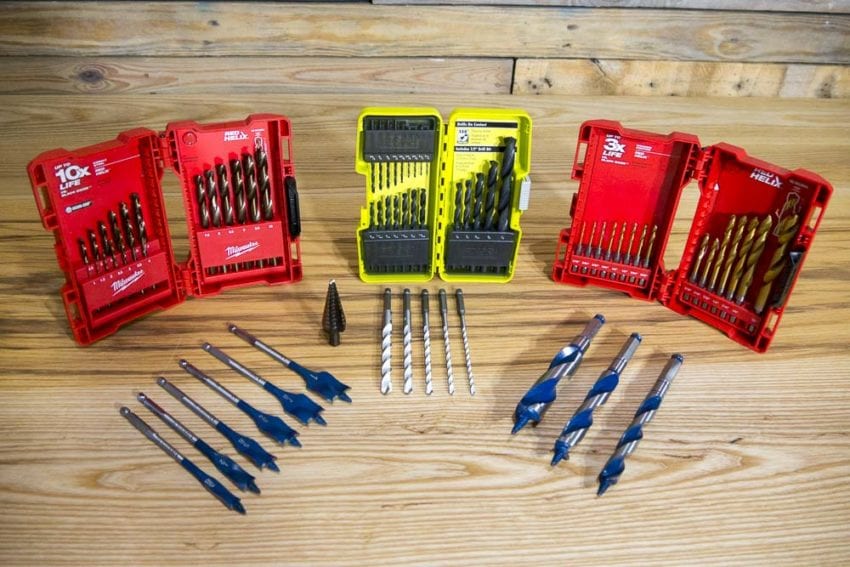

Which material is best for different types of tasks
When selecting a bit set for your impact driver, it is important to choose a set that contains the right type of bit for various tasks and materials. The material of your bits will have a major influence on their durability, performance and applications. Depending on the job, you may need bits made with high-speed steel (HSS), cobalt, titanium or carbide.
High-speed Steel (HSS): HSS bits are great for general purpose drilling in wood and most metals. Many impact-rated sets have HSS drill bits which also come in various lengths and diameters to make them suitable for various types of tasks.
Cobalt: Bits made from cobalt are better suited for tough materials like cast iron or stainless steel as they can withstand higher temperatures than HSS bits without breaking down. This makes them great for repetitive tasks or heavy-duty drilling projects.
Titanium: Titanium is one of the lightest yet strongest metals available today, so it is perfect for creating longer lasting drill bits that are rust resistant. Titanium is more expensive than other materials as well so these sets tend to be ideal for professional users who value performance and quality over money spent.
Carbide: Carbide is an extremely hard and scratch resistant material which makes it especially useful when drilling through granite, marble or concrete surfaces otherwise difficult to work with other substrates such as ceramic tile or glass panels due to its wear resistance when compared other metals applied in similar applications.
Storage and Organization
The bit set you buy should include both the bits and a convenient storage case that allows for easy organization and transport. An impact driver bit set should include a variety of bits designed to fit the various screws and bolts that come with different projects. A comprehensive set should have a variety of Phillips, Allen, Torx, posidriv, and Robertson head bits in different sizes. However, those are just the basics when it comes to an impact driver bit set. You’ll also want to make sure your bit set is organized in a convenient way so you can quickly find the right bit at any moment.
Some organization tips include:
- Check how many compartments are available in the case as this will indicate how many tools can be stored there.
- Ideally, choose a case with magnetized holders that keep each tool in place because this will save you time during search trips.
- Seek out sets with clear covers that make it easy to see which bits are included without having to rummage through them all.
- Large handle openings allow for better grip when trying to grab the appropriate tool from its casing.
- Soft closes on lids allow for more precise control over how easily or firmly bits remain in their holders within the case.
Different types of storage options for bit sets
When shopping for the right bit set for your impact driver, storage is an important consideration. There are a variety of options available, but depending on your needs and preferences you may prefer one method over another. Consider the following storage options as you narrow down which bit sets to purchase.
Hard Case: This type of storage offers excellent protection against damage and accidental loss as it usually involves some form of hard plastic enclosure. Hard cases may also include foam cutouts to prevent bits from sliding around or becoming misplaced inside the case.
Soft Tote: These bags are often made out of canvas or other soft fabric materials and offer great portability and convenience for transport in a toolbox or at job sites. Soft totes generally have multiple compartments to keep accessories from becoming jumbled up with each other, and some products may even include interior pockets for added convenience.
Wall Mounts: Wall mounts provide a convenient way to store larger bit sets once you reach your destination. By affixing wall mounts onto wall studs near work areas, you can easily access your tools without needing to drag them out of confined spaces such as toolboxes or drawers; simply grab the bits off the mount when needed!
Stackable Cases: This type of storage is ideal if you have limited space in a workshop or garage area – many stackable cases are designed to fit inside toolboxes or can be mounted on shelves for easy retrieval when working on projects around the house or jobsite. Stackable cases typically feature deep compartments that let each bit stay firmly in place while also providing ample protection against dust, dirt, and other outdoor elements.
Pros and cons of each storage option
When it comes to storing your bit set for your impact driver, there are several factors to consider. Let’s go through the pros and cons of each storage option so you can make an informed decision.
Soft case: Soft cases make it easy to keep your bits organized, as they usually have several slots or pockets of various sizes that make it easy to separate and store bits so they don’t get mixed in with other components. Soft cases also protect the bits from physical damage, moisture and dust. One downside is that when the case gets full (and bits easily can), it can be difficult to locate the bit you are looking for amongst all the rest.
Bit holders: Bit holders can come in various shapes and sizes and make finding a particular bit much easier than rummaging around in a larger case or box of bits. Bit holders often come with a magnetic base that allows you to attach any size or type of bit without having to worry about finding exactly the right size slot for them in a hard or soft case – this makes it much easier if you have multiple types/sizes of one particular type of bit but don’t want bulky cases containing each individual bit size. On the downside, if not stored properly in a secured location these types of holders may be prone to spills that could lead to lost parts.
Organizer drawers: Organizer drawers provide plenty of room for storing both long shanked and short shanked bits, along with other related accessories like drill chucks and adapters for special applications. They also provide some degree of protection against dust and dirt, though generally not as much protection as conventional soft cases or hard boxes do – however, their biggest advantage is that everything is neatly organized which makes finding specific items much easier than rummaging around in a large bag or box filled with disorganized components! The biggest downside is that depending on how many pieces come in your set; these drawers can become large and cumbersome — making transporting them from work site to work site more difficult than either soft cases or hard boxes do.
Maintenance and Care
It’s important to properly maintain and care for your bit set in order to ensure it functions properly every time you use it. Here are a few tips to help you keep your set in top condition:
– Always unplug the corded drill before changing bits or accessories.
– Keep your bit and accessory storage cases clean, dry and protected from extreme temperatures.
– Inspect the bit shank and chuck jaws for any damage. If there is any visible damage, stop using the tool until it is repaired or replaced by a professional.
– Oil moving parts regularly with a light oil like 3-in-1 oil, which can be found at most hardware stores.
– Keep all cords away from heat sources such as hot pipes, open flames and electrical outlets.
– Store bits away from direct sources of moisture or humidity, such as moisture from water or tanks nearby.
– Replace worn bits promptly to avoid unsafe operation of the tool and keep them sharp for easy use during projects.
Tips for keeping your bits in good condition
It’s important to take care of your impact driver bits to ensure that they are able to perform their best. Below, you will find some tips for keeping your bits in good condition and getting the most out of them.
Ensure Cleanliness – Bits should be wiped off after every use and checked for dirt and debris, which can cause rust or damage.
Periodically Sharpen – Leather strops, diamond stones and abrasive paste are often used by professionals to sharpen dull drill bits and maintain cutting edges. Check the manufacturer’s instructions for more specific guidance on sharpening.
Store Properly – Always store your impact driver bits in a dry environment and keep them away from moisture. If possible, try storing each bit in its own individual pouch or container to protect it from dust and dirt when not in use. Be sure also not to expose them to too much heat as this can also promote rust or weaken cutting edges on some materials. When organizing your workshop, consider storing all of your impact driver bits together so you can easily locate them when needed.
Store Selectively – Try only to store the bits that you use most frequently rather than an entire set at once. Get into a routine of returning the ones that you don’t need regularly into storage cases or cabinets until needed again; this will help keep them organised further increasing their lifespan as well as making it easier for others if they need access directly into your work area/shed etc..
How to clean and maintain your bit set
Keeping your bits in good condition will help ensure they last longer and provide you with better performance when using your impact driver. Here are some simple tips on how to clean and maintain your bit set:
- Clean the parts of the bit set with a damp cloth and dry before storage. This will remove any dust or debris so that it does not become embedded in the bits over time.
- Check for wear or damage on the bit set and check for signs of corrosion as metal bits can corrode over time if you leave them exposed to moisture or dirt. Replace worn or damaged bits for best performance.
- Use a mild, non-oily lubricant on the metal parts of the bit set from time to time, such as a corrosion inhibitor like WD-40, to prevent rusting and extend their life even further.
- Avoid using chemicals on the bit set because they can damage the coating or material of chisels and other tools made from softer materials like plastic or wood.
- Store your bits in a clean, dry container such as a plastic box that is designed to hold screwdrivers and other small items, ensuring they do not rub up against each other while in storage. Pull out only one type of bit at a time so you can quickly find what you need without having to search through unrelated items or accidentally mix different sizes together which could cause frustration when needing specific sizes later on.
Conclusion
When selecting a bit set for an impact driver, consider the following factors: length, type of bit, type of shank, speed rating, and price. It is important to ensure that the bits you choose can be used with your particular impact driver and will last long enough to get the job done.
Additionally, it is important to ensure that the bits you select are suitable for the application they will be used in (for example, softwood versus hardwoods).
Lastly, choose a bit set that fits within your budget while still meeting all of your needs. With these considerations in mind, you should be able to select the perfect bit set for your impact driver.
FAQs
What impact driver bits do I need?
It depends on the type of screws you will be using.
Can you use any bits in an impact driver?
No, you need to use bits specifically designed for impact drivers.
What setting do I use on an impact driver?
The setting depends on the type of screw and the material you are driving it into.
How do you match a driver bit to a screw?
Match the size and type of the screw head to the corresponding driver bit.
What is the most common impact driver bit?
The Phillips head bit is the most common.
Which driver bit is best?
It depends on the type of screw and the material you are driving it into.
What is a good size impact driver?
A 1/4 inch hex chuck is a common size for impact drivers.
What PSI should my impact driver be?
The PSI depends on the specific model of the impact driver.
How strong should my impact driver be?
The strength depends on the specific model of the impact driver.
Do I need special bits for impact driver?
Yes, you need bits specifically designed for impact drivers.
See Also-
- Best impact driver for automotive use
- Best impact driver for mechanics
- Best impact driver
- Best impact driver for lug nuts
- Best makita impact driver
